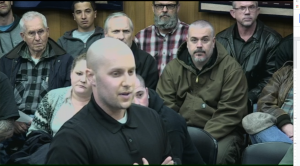What Washougal’s city attorney said about ‘Second Amendment Sanctuary” cities

Eric Hargrave, the owner of Limitless America, wants Washougal to become a Second Amendment Sanctuary city.
Although Initiative 1639 passed with nearly 60 percent of the vote last November, opponents of the gun control measure have turned to local jurisdictions in hopes of preventing it from taking hold. But on Thursday, the attorney for the city of Washougal threw cold water on the idea.
Since the initiative passed, it’s seen a court challenge, and at least 20 county sheriffs in Washington have refused to enforce it, according to the Guardian. A group of gun rights activists are also asking local jurisdictions in Washington to pass resolutions committing to not enforcing the initiative.
On Monday, opponents of I-1639 showed up to Washougal City Council to ask the city’s leaders to join them. Eric Hargrave, the owner of Washougal gun store Limitless America, asked the council to sign on to a resolution declaring the city a “Second Amendment Sanctuary” that would not give any support or enforce any law that violates people’s constitutional right to bear arms.
Joey Gibson, the leader of far-right group Patriot Prayer, has been on the road holding rallies to ask small cities to adopt “sanctuary ordinances.” Gibson was also present at the meeting.
“What we want to do is we want to give power to you guys, the city council, and less power to Seattle and Olympia,” he said.
Toward the end of the meeting, the city council seemed receptive. Washougal Mayor Molly Coston added that she was impressed by the “quality of discussion” and the respectfulness of those who showed up to speak. Councilor Brent Boger asked the city attorney to look into Washougal’s options.
Thursday afternoon the city posted on its website the three-page opinion of Washougal City Attorney Ken Woodrich on the enforcement of I-1639. According to Woodrich, the brief answer to whether Washougal can declare itself a “I-1639 sanctuary city” and decline to enforce the initiative is:
“Until a statute is either overturned or stayed by the courts, it is presumptively constitutional and an ordinance or rule adopted contrary to a statute is preempted and legally null and void,” reads the opinion. “Failing to enforce the statute would violate the Oath of Office sworn to by law enforcement officers, elected officials and the City Manager.”
Specifically, the Woodrich wrote that “local ordinances or regulations may not conflict with state laws.”
